| Partner update 19th February 2021 from Surrey Heartlands CCG |
| Welcome to our regular Covid-19 vaccination update. This short update will be published and circulated every Monday, Wednesday and Friday, in addition to our weekly vaccination newsletter. If you wish to subscribe/unsubscribe please email us at: syheartlandsccg.comms@nhs.net |
| Latest video – The Covid-19 vaccination programme explained |
| Watch our latest video with Dr Sally Johnson here where she explains how our local vaccination programme is working and answers some common questions. Reminder – please help to remind people they should only attend with a booked appointment Unfortunately a message was circulated in error earlier today about surplus vaccine at the Epsom Racecourse vaccination centre being available today and over the weekend. This is not the case and we are urging people to please not attend the site unless they have a booked appointment. If you can help by retweeting our message we would be very grateful. |
| Vaccination centre opening hours |
| Our local vaccination programme works flexibly to allow for changes in vaccine supply, booking numbers and other factors to ensure we make best use of our resources. This means that our sites don’t necessarily operate every day (although they are open most days). Frontline teams plan patient appointments accordingly to ensure the most efficient service; as a reminder, we aren’t able to offer vaccinations to anyone without an appointment. Across Surrey Heartlands we continue to make really good progress to deliver vaccinations to all the priority cohorts within the timescales expected. |
| Latest FAQs |
| You can find a comprehensive set of FAQs on the local programme on our website here. |
| When will I be contacted about making an appointment to receive my second dose? Patients will be contacted just prior to 11 weeks after they received their first dose. The organisation that vaccinated you in the first place is responsible for ensuring you are re-contacted to receive your second dose. If you booked your appointment via the National Booking Service (for example at Epsom Racecourse or a community pharmacy) you should already have your second appointment. |
| Useful links · FAQs · NHS.UK Covid-19 vaccine · GOV.UK Covid-19 vaccination programme · Data release · Information on priority groups |
Free school meals update for half term
I thought it would be useful to provide a bit of an update on the provision of the free school meals in Surrey over half term.
This half term, Surrey County Council will continue to ensure all 18,000 children in the county eligible for Free School Meals are supported.
This is using money provided by the government as part of £170m COVID Winter Support Grant announced in November 2020. The Winter Support Grant has so far supported 26,661 households in Surrey since it was announced.
Food vouchers worth £15 per child were sent to parents and young people by email or text by Friday 12 February. Printed vouchers are being provided to parents who cannot access them online.
These vouchers can be only be exchanged for food and can be used in most supermarkets and the McColl’s chain of local shops.
The national free school meals programme only covers term time.
Wonde, a national provider of free school meal vouchers, will send the vouchers direct and ease the burden on schools that are already busy coping with the impacts of covid-19.
Parents or young people who have received vouchers or who have questions can find out more on the School Vouchers support website.
I hope that is useful. If you have any questions, do please let me know on Nikki.Barton@surreycc.gov.uk
Officer reply regarding delays caused by temporary lights
I have had many requests to address the delay at the temporary lights at Tesco by Lion Green.
Here is an officer reply received today:
Sent: 12 February 2021 13:22
To: Nikki Barton <Nikki.Barton@surreycc.gov.uk>
Subject: Surrey Highways Reference: 1794388 – LION GREEN, HASLEMERE Dear Cllr Nikki Barton,
Thank you for your recent enquiry which has been logged as follows:
Reference number: 1794388
Location: LION GREEN, HASLEMERE
Details: Traffic Operations – Delays
We have asked our contractors to run the portable traffic signals on Manual Control for busy periods. Unfortunately portable signals can never be as “intelligent” or efficient as permanent signals and some delays are unavoidable.
We have also requested for the stretch of parking bays outside the party shop and Kelway Law to be suspended. This should allow traffic coming down the hill to be able to drive through the parking bays to improve traffic flow and allow larger vehicles to proceed through the works more easily. This is being done from Monday. This should help to alleviate congestion. Please pass on our apologies for any disruption to customers and residents. Thank you.
Once again thank you for contacting us. If you have any further queries or require additional information you may find the following “frequently asked questions” page on our website useful: http://travel.surreycc.gov.uk/faq.aspx
Kind regards
Traffic Operations Team
Surrey Highways
__________________________________________________________________________
The reply was in response to my message below to the team regarding the lights:
Traffic signals team: TESCO lights malfunctioning, Haslemere – The traffic lights at Tesco, Haslemere are malfunctioning- with lights sticking on green/red- with over 20 minute waits to exit the Tesco store. This is leading to conflict between drivers.
Please could this issue be addressed as soon as possible- please let me know when the issue will be resolved.
Many thanks
Cllr Nikki Barton
Mobile Coronavirus Testing – Haslemere
Dear Councillors and Clerks,
A mobile Coronavirus testing facility is being established in Weydown Road Car Park, Haslemere, from Friday 12 February to Sunday 14 February.
Testing is available to all those with COVID-19 symptoms, but must be pre-booked online. Booking for this site is open from 5pm the evening before and on the day.
Residents should book on the national testing portal: visiting www.nhs.uk/coronavirus or call the NHS on 119.
Those without an appointment will be turned away.
You can walk into the testing centre, but will still need a pre-booked appointment.
Please feel free to share with your networks.
Kind regards,
Communications and Engagement Officer
Waverley Borough Council
Surrey Heartlands Covid-19 Vaccination Programme Partner Update
I received this update yesterday from Surrey Heartlands:

Bad weather update
Snow and flood warnings are in place for parts of Surrey this weekend (6/7 February). Our Covid-19 vaccination services are currently expected to run as normal but if this changes we’ll share any updates on our website here. In case of adverse weather, we would ask people to travel safely and if they can’t attend, please don’t worry, we’ll be in touch to reschedule. For those attending, we would like to remind you (just in case of any queuing although this will be kept to a minimum) to:
- Dress warmly
- Try to arrive on time but not early
- If you are coming by car and are early, please stay in your car until close to your appointment time
- Bring a warm drink in a flask
Latest data
The latest published data here shows we have now delivered a total of 148,294 first dose vaccinations across Surrey Heartlands (up to 31 January). Our latest infographic below shows more detail; the graphic is also available on our website here.
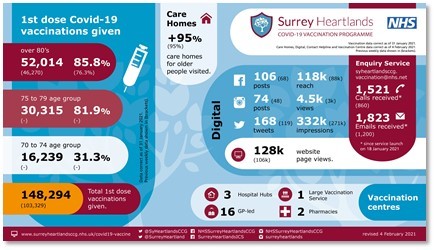
In conversation with Dr Sally Johnson
Dr Sally Johnson, GP and clinical lead for our vaccination programme, answers lots of common questions and myth busts in this latest video which you can watch here. (Subtitles can be activated by clicking on the CC button along the bottom row of the video).
Latest FAQs
You can find a comprehensive set of FAQs on the local programme on our website here. In the meantime, we will regularly publish the answers to some of the most common/latest questions here.
How are you choosing who to vaccinate when?
We are currently offering the COVID-19 vaccine to people in JCVI priority groups 1 to 4. We are hoping to complete these priority groups by the middle of February. These include:
- all those 80 years of age and over
- we are proactively contacting anyone who has not yet been vaccinated by telephoning and writing to them. We are reviewing all GP lists to ensure we have not missed anyone
- frontline health and social care workers
- all those 75 years of age and over
- all those 70 years of age and over and clinically extremely vulnerable individuals.
- People with the following conditions are automatically deemed clinically extremely vulnerable:
- solid organ transplant recipients
- people with specific cancers
- people with cancer who are undergoing active chemotherapy
- people with lung cancer who are undergoing radical radiotherapy
- people with cancers of the blood or bone marrow such as leukaemia, lymphoma or myeloma who are at any stage of treatment
- people having immunotherapy or other continuing antibody treatments for cancer
- people having other targeted cancer treatments that can affect the immune system, such as protein kinase inhibitors or PARP inhibitors
- people who have had bone marrow or stem cell transplants in the last 6 months or who are still taking immunosuppression drugs
- people with severe respiratory conditions including all cystic fibrosis, severe asthma and severe chronic obstructive pulmonary disease (COPD)
- people with rare diseases that significantly increase the risk of infections (such as severe combined immunodeficiency (SCID), homozygous sickle cell disease)
- people on immunosuppression therapies sufficient to significantly increase risk of infection
- problems with your spleen, for example splenectomy (having your spleen removed)
- adults with Down’s Syndrome
- adults on dialysis or with chronic kidney disease (stage 5)
- women who are pregnant with significant heart disease, congenital or acquired
- other people who have also been classed as clinically extremely vulnerable, based on clinical judgement and an assessment of their needs. GPs and hospital clinicians have been provided with guidance to support these decisions
- If someone considers themselves to be clinically extremely vulnerable but their clinical condition is not included in the list above, they are advised to contact their GP or specialist to discuss.
- People with the following conditions are automatically deemed clinically extremely vulnerable:
Useful links
Surrey County Council Highways Winter update for Friday 5 February through to Monday 8 February.
Continued rain over the next two days, this combined with lowered temperatures may cause ice and a skid risk. Looking further ahead there is a chance of snow and dropping temperatures causing further problems on Surreys road. Surrey Highways are working hard to keep the roads clear, safe and Surrey moving.
Snow
The Met Office has issued a yellow weather warning for Surrey across the weekend – UK weather warnings – Met Office
The current forecast is that we will get snow across the county from later Saturday night early Sunday morning. Significant accumulations of snow are possible, particularly in the east of the county and on higher ground. The daily winter updates will continue to be sent out with more specific information when treatments are planned.
We have a team of snow ploughs, 4x4s and our snow angels on standby to assist as necessary – they help with clearing pavements and local roads/routes.
We have enhanced gritting and provisions for the testing and vaccinations sites across the county, our routes can be found online along with which roads get gritted – Salting routes in Surrey – Surrey County Council (surreycc.gov.uk)
Winter advice can be found online with lots of links to help you prepare for the ice and snow – Winter advice 2020-21 – Surrey County Council (surreycc.gov.uk)
There is a salting and gritting fact page that we have updated and it has much of the information attached to this email – Salting and gritting facts – Surrey County Council (surreycc.gov.uk)
We will continue to update as necessary throughout the weekend, and our dedicated road and transport updates page will be updated as necessary – Roads and transport updates – Surrey County Council (surreycc.gov.uk)
Rain/Flooding
The river levels remain very high following the recent rainfall and you may have seen that the Environment Agency have deployed a temporary flood barrier at Walton Lane in Weybridge.
A number of other areas in the county have also seen flooding of roads due to the rainfall and high groundwater levels preventing water draining away.
The river levels have stabilised and should start to drop over the coming days, however as the catchment remains wet any further rainfall is likely to have an impact.
If there is a threat to life – call 999
· If there is road flooding – call Surrey CC (Highways) – 0300 200 1003
· If sewers and foul water are involved – call Thames Water – 0800 316 9800
· If a main river watercourse is involved – call the Environment Agency – 0345 988 1188
If your enquiry is not urgent, please contact our team via flooding.enquiries@surreycc.gov.uk.
****************************************************************
10 things you never needed to know about gritting…………..
1. Road Surface Temperatures Are Important. When we watch the weather forecast we are advised of anticipated air temperatures. However, road surface temperatures and air temperatures are rarely the same and the road surface temperature is also used to make decisions on when to apply salt. In order to make sure rock salt is used as efficiently as possible, we use high-tech road sensors that are able to determine road surface temperature. They combine the data with local forecasts before deciding whether gritting is appropriate or not. We currently have 11 road sensors at our weather stations across Surrey, and a further 30 sensors in other locations in the process of being installed this year.
2. Myth – Once the gritter has put salt on the road all ice will melt. This is not true! Spreading salt on the road is only the start of the de-icing process. Movement of salt around the road by traffic is essential to complete the process. Overnight, when traffic levels are low, roads can take longer to melt ice if it has formed.
3. Myth – Spreading salt on fresh snow will melt it more quickly. This is not true! Salt only effectively melts snow when it is less than 40mm deep and traffic can move the salt around.
4. Myth – No matter what the temperature salt will melt the ice. This is not true! Salt is less effective at temperatures below minus five degrees centigrade and takes longer to melt snow and ice in these conditions.
5. How it works; by spreading salt, passing lorry, bus, van and car tyres crush the salt crystals and create a saline solution. This melts any ice present which then washes away into nearby storm drains, leaving roads clear.
6. Gritting is not just about cost – Cost is not the only factor that prevents use using gritting lorries on certain roads. A bigger problem is that some roads and locations are inaccessible in certain locations. This is why we have 1815 grit bins in strategic locations and a small army of farmers who help us with the ploughing and gritting.
7. Gritting is a skilled operation – Gritting requires good driving skills and the ability to operate machinery in challenging conditions, usually in the middle of the night when it’s freezing outside and there is only limited visibility at best. Drivers are City & Guild qualified and have CPC and HGV qualifications
8. The rate and speed of the salt spread is electronically controlled by the lorries. The routes are all GPS tracked with vehicle, speed, location, spread and time on all our routes.
9. We have 11 weather stations across Surrey that give us hourly updates; which show the anticipated air temperature, road surface temperature, wind speed and rain or snowfall. We also have an agreement with neighbouring authorities and Highways England to sue their data. We plan gritting treatments from this information. We also receive a two to five-day forecast every day to help us plan ahead. Each station has a sensor embedded in the road that monitors if the road is ‘chemically wet’ – whether it still has salt dissolved in it from the last treatment or not.
10. The P1 Routes are 39% of the entire counties road network. All treatments are completed within 3 hours.
How are members of staff are involved in gritting? No-one works on gritting full-time. All gritting staff fit their work in around their other full time jobs at the council during the winter season (mid-October to mid-April).
Why are gritters sometimes not spreading salt? This can be deceptive. Gritting vehicles have become more sophisticated, and lorries now dispense the required amount of salt directly down on to the road in a fine spray that you may not see. However, sometimes a vehicle might not be spreading any salt. This might be because:
- • it hasn’t reached the starting point of its treatment route • it is returning to the depot to refill
- • It is driving on a road that is not on the gritting route.
- • it is driving over a section of road that has already been treated by a fellow driver
- • Treatments are occasionally treated prewet (salt and brine mixed) and treatments aren’t clearly visible
Every gritting vehicle is fitted with a GPS system which tracks its route and speed, and it’s part of the inspector’s job to make sure the lorries don’t deviate from their routes. The system also records at what time and location the vehicle is treating and this is monitored after each run to ensure routes are being treated correctly.
The science of gritting
Although we call it gritting, there is in fact little or no grit involved. What is actually spread on the roads is mined rock salt (sodium chloride). The bottom line is this: salt lowers the freezing point of water, and this is how it helps keep roads clear and safer for driving so that things keep moving despite the freeze. As the salt particles come into contact with the snow or ice, melting begins, and water is produced. This water containing dissolved salt is called “brine.” Brine freezes at lower temperatures than regular water, so it remains a liquid at below-freezing temperatures. The brine works its way further into the snow and ice and eventually down to the road surface. From here, brine can spread out under the ice, breaking the bond between the road surface and the ice. The remaining snow and ice float on top of the liquid brine, allowing traffic to quickly break down into slush. Water freezes at 0°C – the presence of the salt prevents water from freezing until -6°C to -8°C. However, salt starts to become less effective at -5°C and almost ineffective at lower temperatures. In extremely low temperatures, or heavy snowfall, a mix of salt and grit may be used to help vehicles get about. Rock salt needs vehicles to drive over it to work effectively. Vehicles grind the salt into smaller particles to spread it across the road – this means that grit is sometimes not effective when there isn’t much traffic or when there is a lot of snow.
Give your views on the Haslemere Neighbourhood Plan
| News Release Issued by Waverley Borough Council |
Give your views on the Haslemere Neighbourhood Plan
Waverley Borough Council is inviting residents and other interested parties to give their views on the Haslemere Neighbourhood Plan from Friday 5 February 2021.
Haslemere Town Council resolved to prepare a Neighbourhood Plan in 2012 and has now formally submitted the document to Waverley Borough Council for independent examination.
Neighbourhood Plans give local communities the opportunity to decide for themselves what their town or village should look like and how it should develop and grow in the future.
Residents and interested parties will be able to view and comment on the Haslemere Neighbourhood Development Plan and supporting documents for a six week period, until 11.59 pm on Friday 19 March 2021.
The document will be available to view at www.waverley.gov.uk/HaslemereNP.
Hard copies of the documents will not be made available in deposit locations due to the current COVID-19 pandemic. However, if local residents have difficulty in engaging online please contact us via telephone (01483 523291) or email (planningpolicy@waverley.gov.uk) and we will assist in trying to find alternative options to view the documents and make comments.
Comments can be made at www.waverley.gov.uk/HaslemereNP, via email to planningpolicy@waverley.gov.uk or by post to the Planning Policy Team, Waverley Borough Council, The Burys, Godalming, Surrey GU7 1HR.
| For further information contact: |
| Tel: 01483 523296 |
| Web : www.waverley.gov.uk |
Surface Dressing Pre-Patching work on Hindhead Road, Hindhead
Dear Cllr Barton,
Please find attached the letter for the Surface Dressing Pre-Patching work on Hindhead Road, Hindhead. The letters are due to be delivered over the next 2 days.
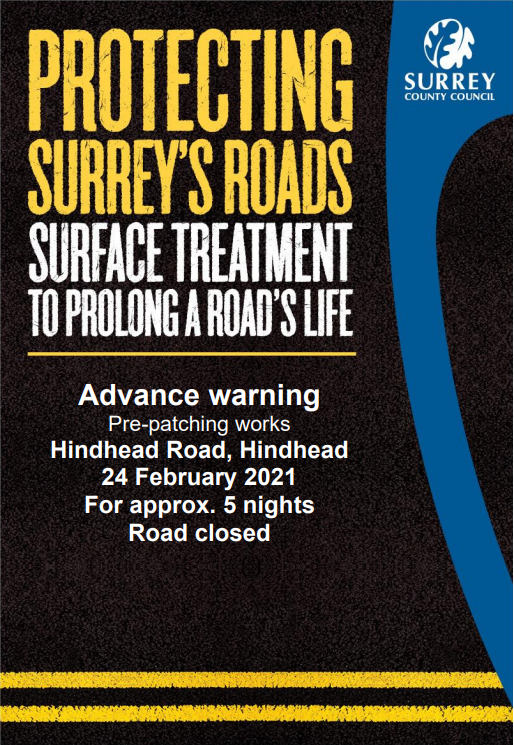
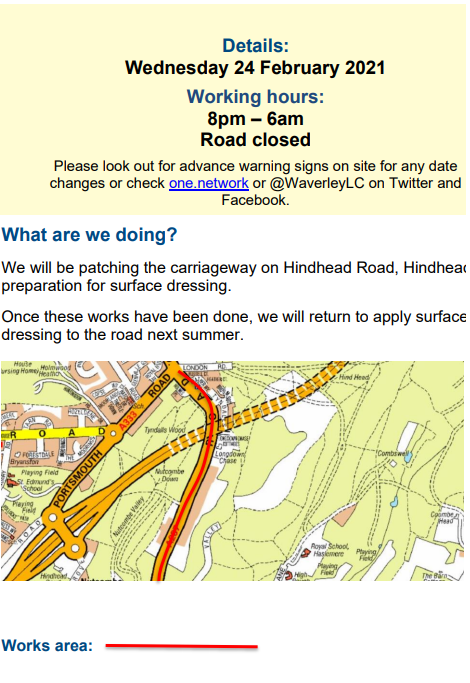
Roadworks during the coronavirus restrictions
The government and Department for Transport have asked the Highway Sector Council to make every effort to deliver essential highways projects on all local authority highway networks, whilst abiding by the COVID-19 safe working practices. We are therefore carrying out these works in line with central government and COVID-19 safe working practises and in accordance with the CLC Site Operating Procedures, endorsed by Public Health England.
Our sub-contractor will have appropriate procedures in place to ensure their staff can comply with government advice. We would ask that you please respect these workers as they deliver these highways services.
We will continue to keep Surrey moving and all key routes will remain open and safe for key workers. For more information visit www.ourroads.today.
If anything changes with the details of these works, we will let you know. You can also find up to date details of the works on www.surreycc.gov.uk/roadworks. If you have any questions please do not hesitate to contact us on works.communication@surreycc.gov.uk.
Surrey Heartlands vaccinations update today
Update from Surrey Heartlands today.

NHS confirms Covid jab now offered at every eligible care home in England
Earlier this week NHS England announced that the Covid-19 vaccination has been offered in over 10,000 care homes with older residents. More information here. In Surrey/Surrey Heartlands we have now visited all care homes with the exception of three (due to local outbreaks), all of whom will be visited by 6th February.
Published vaccination data
NHS England publishes vaccination data for England here which you might like to bookmark as a favourite. The weekly data is broken down by health and care system and age band, currently defined as 80+ and under 80 years old, and the count of vaccinations by dose and ethnicity. The daily data gives a total figure for England and is broken down by region – i.e. for us that would be across the South East.
Latest FAQs
You can find a comprehensive set of FAQs on the local programme on our website here. In the meantime, we will regularly publish the answers to some of the most common/latest questions here.
Why has the second dose interval been extended to 12 weeks?
• Throughout this global pandemic we have always been guided by the latest scientific advice. Having studied evidence on both the Pfizer/ BioNTech and Oxford/ AstraZeneca vaccines the JCVI (Joint Committee for Vaccination and Immunisations) has advised that we should prioritise giving as many people in at-risk groups their first dose, rather than providing two doses in as short a time as possible.
• Evidence shows that one dose of either vaccine provides a high level of protection from Covid-19. This is because even with just one dose the Pfizer/BioNTech vaccine has been estimated to offer 89% effectiveness from two weeks after it is given, and the Oxford/AstraZeneca 74% effectiveness from two weeks after it is given.
• For both vaccines, data provided to MHRA demonstrate that whilst efficacy is optimised when a second dose is administered both offer considerable protection after a single dose, at least in the short term. For both vaccines the second dose completes the course and is likely to be important for longer term protection
• The NHS across the UK will prioritise giving the first dose of the vaccine to those in the most high-risk groups. Everyone will still receive their second dose and this will be within 12 weeks of their first. The second dose completes the course and is important for longer term protection.
As the Deputy Chief Medical Officer, Jonathan Van Tam, has said: “The evidence clearly shows vaccinated individuals get almost complete protection after the first dose. Simply put, every time we vaccinate someone a second time, we are not vaccinating someone else for the first time. It means we are missing an opportunity to greatly reduce the chances of the most vulnerable people getting severely ill from Covid-19. If a family has two elderly grandparents and there are two vaccines available, it is better to give both 89 per cent than to give one 95 per cent protection with two quick doses, and the other grandparent no protection at all.”
As a local health and care system, we are following the advice from the Government’s Chief Medical Officers.
Useful links
· FAQs
Temporary traffic lights Lion Green/Wey Hill, Haslemere – Traffic light refurbishment works
Please find attached the leaflet for the traffic light refurbishment works on Lion Green/Wey Hill/Tesco access, Haslemere. The leaflets will be delivered to local residents and businesses over the next few working days.
Lion Green/Wey Hill/Tesco access, Haslemere
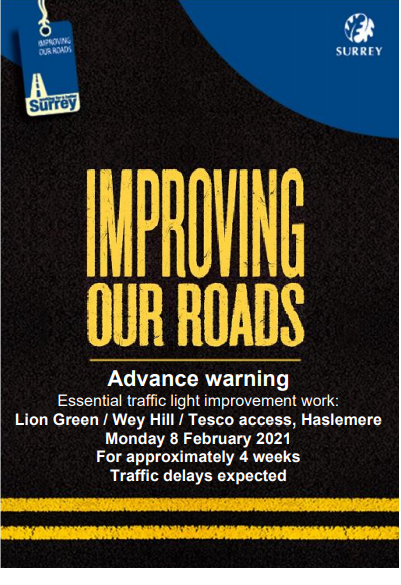
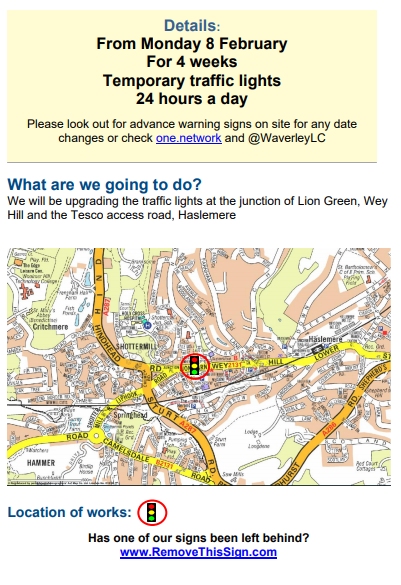
Temporary traffic lights
8 February
For 4 weeks
Please see the attached leaflet for the extents of our work.
Roadworks during the coronavirus restrictions
The government and Department for Transport have asked the Highway Sector Council to make every effort to deliver essential highways projects on all local authority highway networks, whilst abiding by the COVID-19 safe working practices. We are therefore carrying out these works in line with central government and COVID-19 safe working practises and in accordance with the CLC Site Operating Procedures, endorsed by Public Health England.
Our sub-contractor will have appropriate procedures in place to ensure their staff can comply with government advice. We would ask that you please respect these workers as they deliver these highways services.
We will continue to keep Surrey moving and all key routes will remain open and safe for key workers. For more information visit Roadworks and maintenance during the coronavirus outbreak – Surrey County Council (surreycc.gov.uk)
Sometimes our plans have to change, often due to bad weather or problems on other works in the same programme which can have a knock on effect. If anything changes with the details of these works, we will let you know.
You and your residents can also find up to date details and receive updates of the works on https://one.network/
If you have any questions please do not hesitate to contact us on 0300 200 1003 or email works.communication@surreycc.gov.uk.
Kind regards,
Works Communication Officer
Works Communication Team
Surrey Highways
